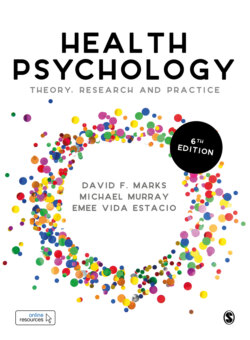Читать книгу Health Psychology - Michael Murray - Страница 8
На сайте Литреса книга снята с продажи.
Preface
ОглавлениеWelcome to Health Psychology: Theory, Research and Practice (Sixth Edition). This textbook provides an in-depth introduction to the field of health psychology. It is designed for all readers wishing to update their knowledge about psychology and health, especially undergraduates and postgraduates taking courses in health psychology, medicine, nursing, public health, and other subjects allied to medicine and health care. The authors strive to present a balanced view of the field and its theories, research and applications. We aim to present the mainstream ideas, theories and studies within health psychology and to examine the underlying theoretical assumptions and critically analyse methods, evidence and conclusions. This edition updates all content from previous editions and adds significant, core topics from the biological and clinical domains.
All mainstream domains and topics relevant to health psychology are included. A key feature of this textbook is the equal priority given to the three aspects of the biopsychosocial (BPS) approach: biological, social and psychological determinants of health, illness and health care. The authors argue that both social embeddedness and psychological influences are as important to health and illness as genes and ‘germs’. In this book we attempt to locate health psychology within its global, social and political contexts. We attempt to provide a snapshot of the ‘bigger picture’ using a wide-angle lens, as well as giving detailed, critical analyses of the ‘nitty-gritty’ of theory, research and practice.
This textbook introduces readers to the field of health psychology, the major foundations and theoretical approaches, contemporary research on core topics, and how this theory and evidence is being applied in practice. This more streamlined sixth edition includes a new chapter on stress as well as brand new online case studies. The outbreak of the coronavirus pandemic (COVID-19) occurred as this book was being prepared for production in the first months of 2020. As we were checking the proofs, in May 2020, almost 6 million people had been infected with COVID-19, 2.5 million people had recovered, but, sadly, 350,000 people had died. Around 4 billion people are estimated to have been living under some form of restriction of movement. Unfortunately these numbers will continue to rise (for an interactive dashboard, see Johns Hopkins University, 2020). Unless a vaccine is developed, or we discover medicines to treat the virus, our means of controlling the spread of infection depend entirely upon behavioural changes. Unfortunately,it was impossible here to include an in-depth discussion of the COVID-19 pandemic. However, the COVID-19 pandemic will be a major new topic within the next (7th) edition.
Health psychology is still relatively young, having developed as a sub-discipline in the 1970s and 1980s. The primary mainstream focus has been theories and models about social-cognitive processes concerned with health beliefs and behaviours. This approach has yielded thousands of research publications of a mainly empirical nature to study issues, test theories and models about the causes of health behaviour change, and investigate interventions. The growth of interest in this subject has been truly amazing. Similar to psychology more generally, the primary focus of health psychology has been the behaviour, beliefs and experiences of individuals.
The book introduces alternative, critical approaches to health psychology which are not yet part of the mainstream. We advance the case that psychological issues are embedded in human social structures in which economics and social justice play crucial roles. The mainstream socio-cognitive framework appears to us to be of limited relevance in a world where issues of poverty, social injustice and conflict exist for millions of people, and psychological processes are conditioned by basic limitations of capability, freedom and power (Marks, 1996, 2002a, 2004; Murray and Campbell, 2003; Murray, 2014a, 2014b). We evaluate and critique contemporary psychological theories and models in that context.
In our view, to make a contribution to society, theory, research and practice in health psychology must engage with the real economy, develop approaches for industrial-scale behaviour change, and work with communities and the struggles of the dispossessed. An agenda for health psychology needs to include ‘actionable understandings of the complex individual–society dialectic underlying social inequalities’ (Murray and Campbell, 2003: 236). Preliminary thoughts on ‘actionable understandings’ and of the ‘individual–society dialectic’ are presented in this book. By having access to mainstream and alternative perspectives in a single volume, lecturers and students can reach an assessment of the field and how it could make more progress in the future.
We explain the significance of the biological and social contexts, and review theory and methods (Part 1), analyse the complexity and diversity of health behaviour (Part 2), discuss health promotion and disease prevention (Part 3), and explicate the significance of clinical health psychology for some of the major afflictions of the age (Part 4).
Table P1
Source: Adapted from Dahlgren and Whitehead (1991: 23)
The book uses a multi-level framework that takes into account both the biological determinants and the social context of health-related experience and behaviour. This multi-level framework, the ‘Onion Model’, assumes different levels of influence and mechanisms for bringing about change (see Table P1 and Chapter 1 for details).
Health psychology is a potentially rich field, but, if it is to become more than a ‘tinker’, it is necessary to master an appreciation of the cultural, socio-political and economic roots of human behaviour. In this book, we aim to apply an international, cultural and interdisciplinary perspective. We wish to demonstrate the great significance of social, economic and political changes. As the gaps between the ‘haves’ and the ‘have-nots’ widen, and the world population grows larger, the impacts of learned helplessness, poverty and social isolation are increasingly salient features of contemporary living.
Those concerned with health promotion and disease prevention require in-depth understanding of the lived experience of health, illness and health care. By integrating research using quantitative, qualitative and action-oriented approaches, we take a step in that direction.
